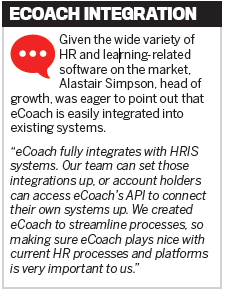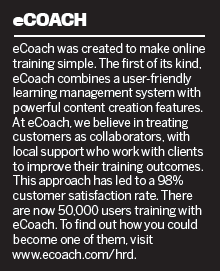
As organisations seek innovative means of providing workplace education, HRD talks to eCoach about the latest trends in e-learning
.jpg)
As organisations seek innovative means of providing workplace education, HRD talks to eCoach about the latest trends in e-learning
Technology has enabled countless workplace innovations – greater speed and increased efficiency among them. But in recent years one of technology’s big achievements has been enabling far greater ease of learning and training for employees. Gone are the days of walls of text and bleak PDFs – workplace training via e-learning is becoming interactive, engaging and fun. When used in an organisation appropriately, e-learning can empower employees to not only stay up to date with the duties of their roles but also to expand their skill sets in a real-world working environment. For HR professionals, this opens up a variety of opportunities. It makes it easier to roll out company-wide learning initiatives while saving on costs and time o‑ site, at the same time providing a way for employees to learn via the means they personally find most effective.
Helping lead this charge is eCoach, a learning provider that was born in 2016 out of a dissatisfaction with existing LMS systems.
“We see eCoach as a product of various large trends in workplace training – learning at your own pace, BYOD, bite-size learning and new technology, among others,” says Alastair Simpson, head of growth at eCoach. “Of course, there’s a lot of overlap between a lot of these trends, which I think is testament to the fact that customers need solutions that will solve multiple problems in one.”
Changing nature of workplace training
The idea of work-related training has itself undergone a significant adjustment in recent years. Traditionally, training has been provided to management and afterwards filtered down to employees, and many employers apparently assume this process will somehow occur via osmosis. Naturally, this raised concerns around productivity and information retention, as knowledge was frequently lost in the process.
“We seem to have put the days of hours-long training programs behind us,” says Simpson. “There’s a time and a place for long-form training, but chunked content has an agility and an effectiveness that can provide real value to trainers.”
Additionally, e-learning makes for an ideal fi t with the current trend towards BYOD in the workplace. With the right platform, employers can reach their employees on their PCs, laptops, tablets or mobiles, with content specifically tailored for each format.
“Currently, around 50,000 people use eCoach for training purposes,” says Simpson. “We find that the majority of those learners are on mobile, so the ability to use your own device is a huge plus for employees.”
Ease of learning
Of course, training innovations have not always been well executed. Historically, many training platforms have been clunky, di cult to navigate and – perhaps worst of all from an employee perspective – uninspiring. Defying these conventions is something that eCoach has taken extremely seriously. Studying the design and function of modern innovators such as Airbnb, Uber and Apple and seeking to apply their lessons to the LMS space has been a key concern for the organisation.
 “There’s a time and a place for longform training, but chunked content has an agility and an effectiveness that can provide real value to trainers” - Alastair Simpson, head of growth, eCoach
“There’s a time and a place for longform training, but chunked content has an agility and an effectiveness that can provide real value to trainers” - Alastair Simpson, head of growth, eCoach
“We’ve done a lot of work around how our user interface and interactive authoring templates can create a more engaging and fun experience for the end learner,” says Simpson. “At the end of the day, if you can create a platform that staff want to interact with, you’ll see training outcomes rise.”
Tailored content and compliance
It’s crucial that organisations should have the content they require to provide the training their employees need. Some businesses find that the content they are able to purchase directly or source from elsewhere is not necessarily relevant to their needs. In such a situation, content creation becomes a necessity, particularly for highly specialised industries or organisations that have highly specific processes and procedures. Accordingly, it’s essential to have an LMS that allows for the insertion of created materials with a minimum of fuss. Trainers and other content creators are often pressed for time, requiring a fast turnaround.
eCoach allows users to fulfil all their training needs – creation, delivery and reporting – on a single platform, rather than requiring a separate content creation platform. This reduces complexity and cost, streamlining the training process. Users can also edit and update content from within eCoach, giving them the ability to make updates or corrections to training resources as necessary.
“No design expertise is necessary,” says Simpson. “Material can be slotted into readymade templates via drag-and-drop, allowing companies greater flexibility in creating training resources.”

At the individual level, managers can even see specific learner actions within a piece of content. For example, they can look at how long a learner spent on each screen within a training program, and at how that compares with the average time other learners spent on that screen. All reporting is also fully exportable, allowing it to be fully synced with other reporting systems. There are also options available for mapping compliance requirements to specific pieces of content, allowing managers to fully map and track compliance training.
Employsure experience
Employsure has been utilising the eCoach authoring tool since December 2017, integrating the content with its own existing LMS. For training sessions that are blended – such as Employsure’s Future Leaders Program – eCoach has aided in bridging the gap between online and classroom learning. Participants complete some pre-work on eCoach, which helps establish a grounding in new subjects prior to entering a more comprehensive training session.
“Having eCoach has enabled much better collaboration when it comes to authoring content,” says Marian Afinidad, head of e-learning. “It’s very intuitive. While we usually have a subject-matter expert work with a designer to create our content, eCoach also allows facilitators without any e-learning background to create content on their own too.”
 “There’s now more variety in learning options for employees. In turn, that’s meant a higher rate of completion of online training” Marian Afinidad, e-learning coordinator, Employsure
“There’s now more variety in learning options for employees. In turn, that’s meant a higher rate of completion of online training” Marian Afinidad, e-learning coordinator, Employsure
Less than a year in, the shift to eCoach already appears to have paid considerable dividends at all levels of Employsure. With much of the organisation’s induction process occurring online, eCoach has enabled Employsure to cater more effectively to different learning styles.
“There’s now more variety in learning options for employees,” says Afinidad. “In turn, that’s meant a higher rate of completion of online training.”

Simpson is positive about the future of the organisation and of e-learning in general. With more innovations on the horizon and a commitment to enhancing workplace learning, eCoach aims to stay at the forefront of the field, keeping ahead of trends.
“We hope to be part of a positive disruption when it comes to workplace training,” Simpson says. “We want it to be a disruption that results in more engaged learners, less frustrated trainers, smoother systems and processes, better training outcomes, and happier, healthier, smarter workplaces.”